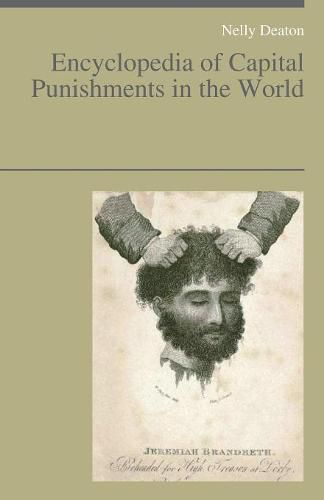Readings Newsletter
Become a Readings Member to make your shopping experience even easier.
Sign in or sign up for free!
You’re not far away from qualifying for FREE standard shipping within Australia
You’ve qualified for FREE standard shipping within Australia
The cart is loading…






This title is printed to order. This book may have been self-published. If so, we cannot guarantee the quality of the content. In the main most books will have gone through the editing process however some may not. We therefore suggest that you be aware of this before ordering this book. If in doubt check either the author or publisher’s details as we are unable to accept any returns unless they are faulty. Please contact us if you have any questions.
Capital punishment, also known as the death penalty, is a government-sanctioned practice whereby a person is killed by the state as a punishment for a crime. The sentence that someone be punished in such a manner is referred to as a death sentence, whereas the act of carrying out the sentence is known as an execution. Crimes that are punishable by death are known as capital crimes or capital offences, and they commonly include offences such as murder, treason, espionage, war crimes, crimes against humanity and genocide. Etymologically, the term capital (lit. of the head , derived via the Latin capitalis from caput, head ) in this context alluded to execution by beheading.
Fifty-six countries retain capital punishment, 103 countries have completely abolished it de jure for all crimes, six have abolished it for ordinary crimes (while maintaining it for special circumstances such as war crimes), and 30 are abolitionist in practice.
Capital punishment is a matter of active controversy in several countries and states, and positions can vary within a single political ideology or cultural region. In the European Union, Article 2 of the Charter of Fundamental Rights of the European Union prohibits the use of capital punishment. The Council of Europe, which has 47 member states, has sought to abolish the use of the death penalty by its members absolutely, through Protocol 13 of the European Convention on Human Rights. However, this only affects those member states which have signed and ratified it, and they do not include Armenia, Russia, and Azerbaijan.
The United Nations General Assembly has adopted, in 2007, 2008, 2010, 2012 and 2014, non-binding resolutions calling for a global moratorium on executions, with a view to eventual abolition. Although most nations have abolished capital punishment, over 60% of the world’s population live in countries where the death penalty is retained, such as China, India, the United States, Indonesia, Pakistan, Bangladesh, Japan and Sri Lanka.
$9.00 standard shipping within Australia
FREE standard shipping within Australia for orders over $100.00
Express & International shipping calculated at checkout
This title is printed to order. This book may have been self-published. If so, we cannot guarantee the quality of the content. In the main most books will have gone through the editing process however some may not. We therefore suggest that you be aware of this before ordering this book. If in doubt check either the author or publisher’s details as we are unable to accept any returns unless they are faulty. Please contact us if you have any questions.
Capital punishment, also known as the death penalty, is a government-sanctioned practice whereby a person is killed by the state as a punishment for a crime. The sentence that someone be punished in such a manner is referred to as a death sentence, whereas the act of carrying out the sentence is known as an execution. Crimes that are punishable by death are known as capital crimes or capital offences, and they commonly include offences such as murder, treason, espionage, war crimes, crimes against humanity and genocide. Etymologically, the term capital (lit. of the head , derived via the Latin capitalis from caput, head ) in this context alluded to execution by beheading.
Fifty-six countries retain capital punishment, 103 countries have completely abolished it de jure for all crimes, six have abolished it for ordinary crimes (while maintaining it for special circumstances such as war crimes), and 30 are abolitionist in practice.
Capital punishment is a matter of active controversy in several countries and states, and positions can vary within a single political ideology or cultural region. In the European Union, Article 2 of the Charter of Fundamental Rights of the European Union prohibits the use of capital punishment. The Council of Europe, which has 47 member states, has sought to abolish the use of the death penalty by its members absolutely, through Protocol 13 of the European Convention on Human Rights. However, this only affects those member states which have signed and ratified it, and they do not include Armenia, Russia, and Azerbaijan.
The United Nations General Assembly has adopted, in 2007, 2008, 2010, 2012 and 2014, non-binding resolutions calling for a global moratorium on executions, with a view to eventual abolition. Although most nations have abolished capital punishment, over 60% of the world’s population live in countries where the death penalty is retained, such as China, India, the United States, Indonesia, Pakistan, Bangladesh, Japan and Sri Lanka.